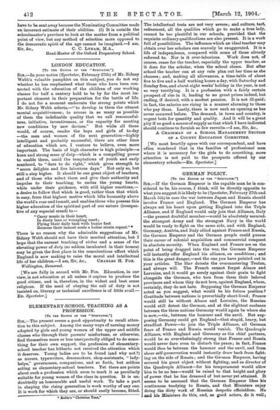LONDON EDUCATION. [To THE EDITOR OP THE " SPECT•TOR.".1 Sin,—In
your notice (Spectator, February 27th) of Mr. Sidney Webb's valuable pamphlet on this subject, you do not say whether he has emphasised what those who have been con-
nected with the education of the children of our working classes for half a century hold to be by far the most im- portant element in their preparation for the battle of life. I do not for a moment underrate the strong points which Mr. Sidney Webb selects,—" to develop in them the utmost mental acquisitiveness ; to arouse in as many as possible of them the indefinable quality that we call resourceful- ness, initiative, inventiveness, or the capacity for meeting new conditions by new devices." But while all these would, of course, render the boys and girls of to-day —the men and women of the next generation—highly intelligent and probably successful, there are other lines of education which are, I venture to believe, even more important. The basis of high character is high principle—a keen and strong sense of duty—which is a compelling power to enable them, amid the temptations of youth and early manhood, to "dare to do right," which gives strength to " scorn delights and live laborious days." Not only so, but still a step higher. It should be one great object of teachers, and of those who select them and give their authority and impulse to their teaching, to endue the young hearts, while under their guidance, with still higher emotions,—
a desire to follow that which is good, rather than that which is easy, from that highest motive which lifts humanity above
the world's roar and tumult, and enables those who possess this higher education of the spiritual part of our nature (irrespec- tive of any especial creed) to- " Carry music in their heart,
In dusty lane or wrangling mart;
Plying their daily task with busier feet Because their inmost souls a holier strain repeat."*
There is no reason why the admirable suggestions of Mr. Sidney Webb should not have their merited attention, but I hope that the earnest teaching of virtue and a sense of the elevating power of duty (so seldom inculcated in their homes) may be given the first place in the conscientious effort which England is now making to raise the moral and intellectual [We are fully in accord with Mr. Fox. Education, in our view, is not education at all unless it aspires to produce the good citizen, and is, therefore, in the widest and best sense
religious. If the need of obeying the call of duty is not insisted on, literary or technical excellence is of little avail.— ED. Spectator.]










































 Previous page
Previous page